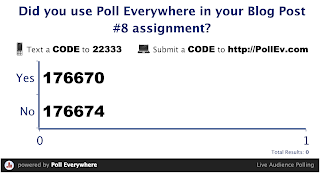Adventures in Pencil Intergration
I guess it's okay that I looked down at the comments to his blog and saw where John T. Spencer says that "It's a mock of I'm a Mac and I'm a PC commercials". But still what is this trying to tell us? I believe Mr. Spencer is just stating his opinion that two things may look the same on the surface, but when you starting using both of them to do the same job, you will find that one is of greater quality than the other. As you see with the pencil comparison, you can use the Papermate pencil because it cost less, but you will be constantly replacing it because it breaks all the time. On the other hand there is the most expensive pencil, the Ticonderoga. When you look at it's dependability and all the features it offers, isn't it worth the investment? If you follow the link above, you will find the Mac vs. PC commercials to be supporting this same idea. I think Mr. Spencer is making us think about how we plan to use an item and then invest in the one that will provide you the greatest tools and resources to do the job. It may be "the most expensive purchase a hipster ever makes", but the key is to look at your return, it just might be worth the investment.
 Why Were Your Kids Playing Games?
Why Were Your Kids Playing Games?After reading this blog, one quote came to mind and it's that some people "can't see the forest for the trees". I got the impression that Mr. Spencer's supervisor is one of those people. If the principal could get past his aversion to games and his concern for test scores, he might get a view of children learning and collaborating and actually having fun at the same time. I've listed a few other links that correspond with learning and gaming; Minecraft in the Classroom, #mysteryskype, and Teachers, Students, Digital Games: What's the Right Mix?.
I strayed from pencilintergration.blogspot.com over to educationrethink.org, because I discovered two blogs that are written by Mr. Spencer that talk about teaching and test scores. I Call That Achievement and Am I Still a Good Teacher?
The Real Reason for My PLN is a great PLN testimony from Mr. Spencer. I enjoyed reading Do We Still Need Schools and Teachers? and all the comments that followed and thought you might enjoy them too.
Don't teach your kids this stuff. Please?
Dr. McLeod has hit the nail on the head! I live in a school district that is providing high school students with Macbooks and the comments he makes echo many of the views and concerns of parents and educators. Before taking this class, I might have been one of those parents who shared some of those same opinions. I now realize technology is a necessity for our students. It's not fluff or a time filler. It's not just for playing games. It is safe, it is monitored, and there are set controls and limitations. Parents and teachers have to work together to help our students understand how to be responsible. Yes, I know they are teenagers, but they can be responsible, otherwise, would we teach them to drive cars? It's dangerous and there are a lot of distractions and bad drivers about which we have to worry, but we train them and make sure they are ready. We don't wait until the day they turn sixteen and say here's the keys...good luck figuring it out. Instead, they have to read the rules of the road, take a test, and then they spend the next six months to a year riding with someone who will guide them and equip them with the tools they need to be a safe driver. I think we have to take the same approach with technology. We can't just give students a computer and expect them to know all of the rules. In a speech written by Franklin D. Roosevelt, he says that "great power involves great responsibility" or you can quote Uncle Ben from Spiderman and say that, "with great power, comes great responsibility". That's where we as teachers and parents have do our jobs and educate our children so they can be safe and responsible drivers on the internet. And I, like Dr. McLeod, can't wait to see how technology transforms education over the next ten to twenty years.
Scott McLeod, J.D., PH.D., is the Director of Innovation for Prairie Lakes Area Education Agency 8 in Iowa. In order to take this roll, Dr. McLeod had to take a leave from his position as an Associate Professor of Educational Leadership at the University of Kentucky. He is an author, a co-creator of a popular video series, and the Founding Director of the UCEA Center for the Advanced Study of Technology Leadership in Education (CASTLE). If you would like to read a more detailed biography about Dr. McLeod, you can visit dangerouslyirrelevant.org/bio.



